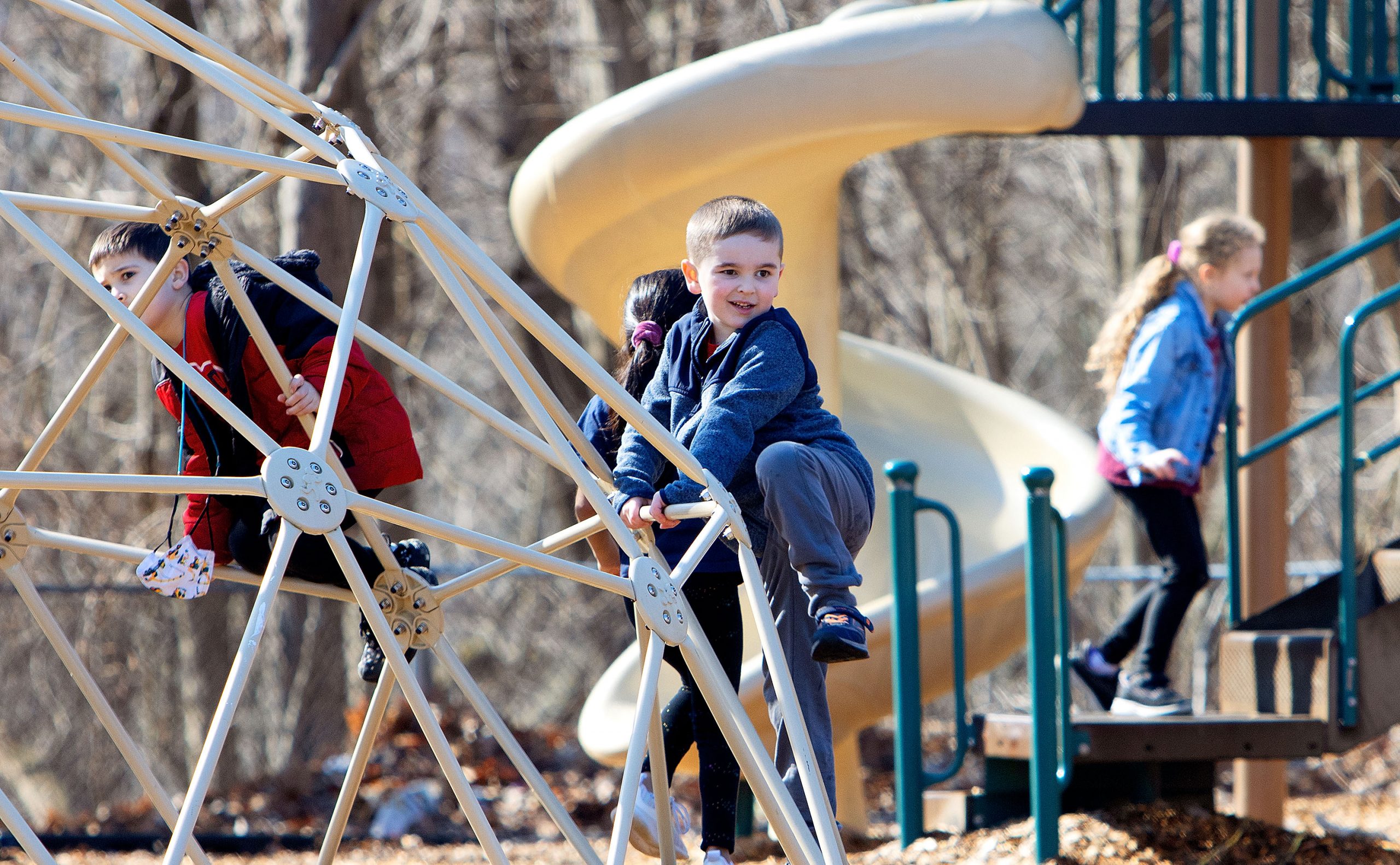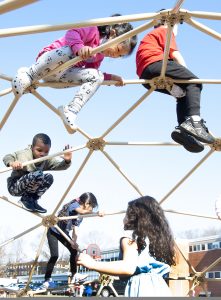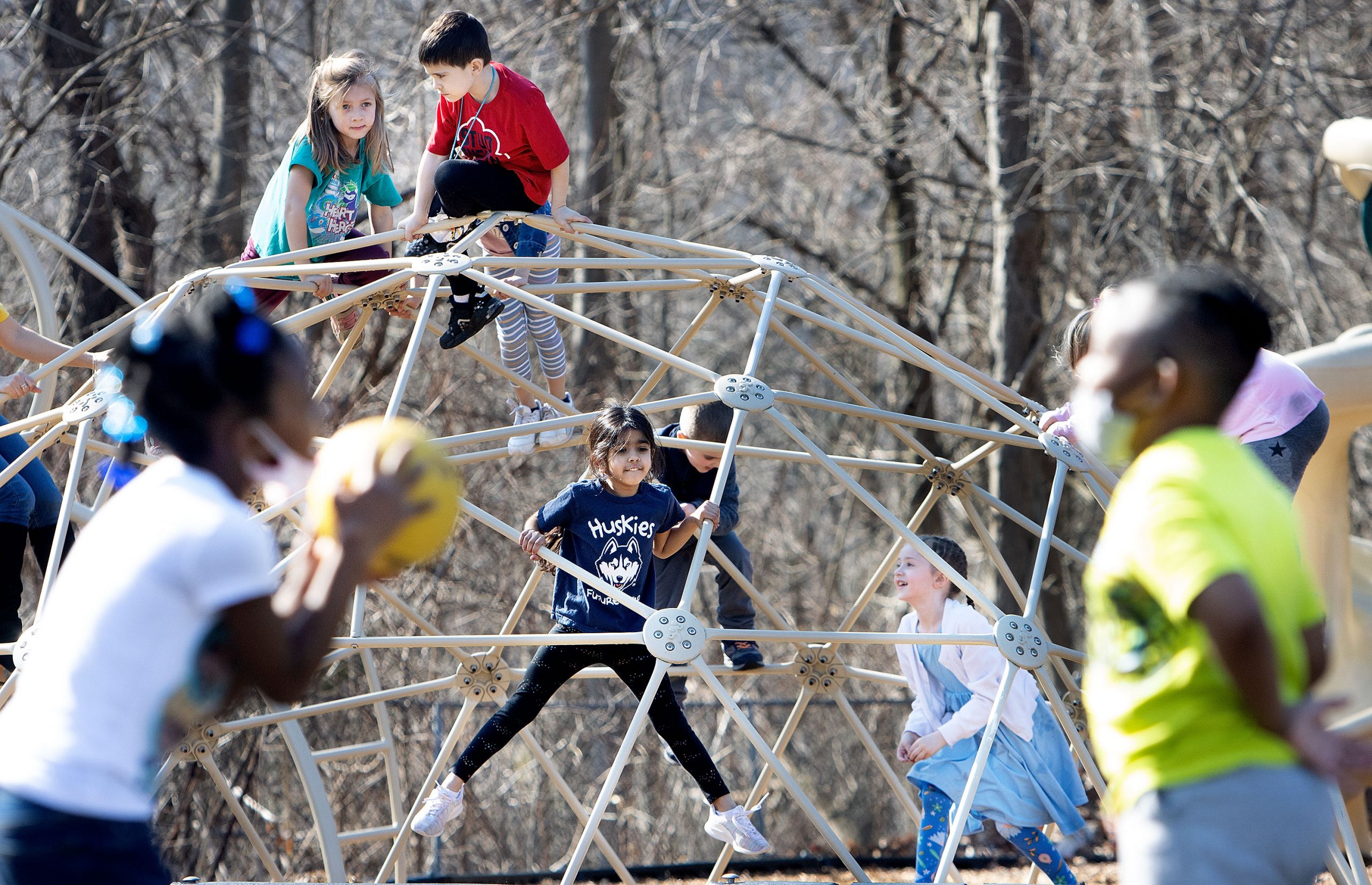
By Lance Reynolds Citizen’s News
NAUGATUCK — As temperatures soared into the low 70s on a bright, sunny morning Friday, Western Elementary School kindergarten teacher Whittney Godin supervised recess.
She saw some of her students swing high on the playground swingset, a handful climb across monkey bars and others playing tag on the blacktop. All were smiling and having fun.
Six-year-old Sophia Hameed said she feels like a mountain climber when she climbs up the playground’s climber. She hopes recess is never taken away from her.
“We won’t be healthy. We won’t be strong,” Sophia said of a world without recess.
State lawmakers agree.
The Committee on Children last week voted 10-3 to advance a bill that would prohibit recess as a form of discipline for grade K-5 students who misbehave in the classroom.
Elementary teachers and school officials across Greater Waterbury and Litchfield County say they already use other disciplinary measures because recess is too important for child development.
Godin is teaching 18 kindergartners this year, her fifteenth in the borough school district.
She’s never taken recess time away from students who misbehave, she said. If students refuse to complete work and are misbehaving, they finish the assignment at the end of the day during free time, she said.

Last year, COVID-19 restricted students from playing basketball, kickball and similar games, Godin said. Instead, she gave her students individual bags of sidewalk chalk.
As the virus wanes, students are back to having fun. Recess has an even greater significance as teachers focus on student social and emotional growth more than ever, Godin said.
“Even pre-COVID, we’re teaching these kids social skills that we used to learn naturally years ago when we went outside to play,” Godin said. “Now, we’re teaching all of these social skills explicitly, but they need the chance in unstructured, real time to practice what we’re teaching them, like problem solving or resolving a conflict.”
Some school officials believe taking recess away as a form of discipline could lead to unintended hardships.
Joselyn DeLancey, vice president of the state’s largest teachers union, Connecticut Education Association, expressed concern about the proposed law in written testimony. She said in some instances, dysregulated students should not participate in recess to prevent bullying and an unsafe play area.
“I believe the issue is not with recess and the withholding of it,” DeLancey wrote, “but rather the need for better tools, more mental health and behavioral supports to ensure restorative practice and proactive measures, and a need for more experienced, practiced, and wise administrators.”
State Rep. Robin E. Comey, D-Branford, co-sponsored the bill with Rep. Lucy Dathan, D-New Canaan, and Rep. Brian Lanoue, R-Griswold.
“I don’t want to present as someone who doesn’t trust teachers or doesn’t trust administrators because I do trust them,” Comey said when the Committee on Children met last week. “I just want to make sure the policy that they’re seeing in their district is strong, and the guidance we’re giving them is going to be most supportive to our kids at these crucial times.”
Recess has been the subject of past legislation. Gov. Ned Lamont in July 2019 signed a bill into law that allowed elementary schools add in 20 minutes of unstructured play time on top of the 20 minutes that schools must devote to recess.

Grade K-3 students at Highland Elementary School have two recesses per day, a 20-minute session part of a lunch break and a 10-minute session in the afternoon, school Principal Scott Jeffrey said. If students misbehave during recess, they are taken out for several minutes before being allowed to participate again, he said.
“It is up to each school to find ways to address behavioral issues that occur during school, working with families, they are our partners,” Jeffrey said.
While most school districts already prohibit recess as a disciplinary measure, lawmakers have collected anecdotal evidence that schools are taking away recess time from students who misbehave, said state Rep. Liz Linehan, D-Cheshire, chairwoman of the Committee on Children.
The bill includes if a student presents a potential danger to themselves and others, recess can be taken away. However, school officials would need to find another 20 minutes where the student could make up for the missed recess, Linehan said.
“When we think about the legislature sometimes we don’t think that creating laws around recess would be at the top of anyone’s list,” she said. “However, people need to recognize that the 20 minutes of physical activity is too short and taking that away has consequences down the line, including childhood obesity, detentions out of school and mental health issues.”
Waterbury school officials don’t expect teachers to take recess away for student misbehavior, Superintendent Verna Ruffin said. Throughout the pandemic, recess has served as mask breaks for students, she said.
Serving as a recess monitor allows Godin to apply what she teaches in the classroom in a natural environment, she said.
“It gives me the chance to play with my students, socialize with them and get to know them better on a personal level,” she said. “If you don’t have that relationship piece, you’re not going to get them anywhere in the classroom.”













